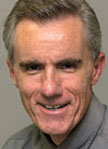Race-ing away from the polls
The first phone call I got Wednesday morning was from a reader who wanted to challenge the assertion we made on Page One.
I was a bit puzzled. Wednesday’s front page was dominated by a picture of Barack Obama and a single word: History.
That’s not what was causing him problems. He questioned the subhed, which declared “Obama elected nation’s first African-American president.”
“It’s misleading and false advertising,” he proclaimed.
The man, who seemed completely rational, calmly explained to me his belief that Obama was simply American, born in Hawaii.
I offered to him that Obama was of mixed race, with a black Kenyan father and a white mother from Kansas. Still, I stressed, there is no real doubt that he is in fact African-American.
He wasn’t buying. He made it clear he doesn’t like this emphasis on African-American.’
“He’s American,” the man said. “My background is Scottish, but I don’t refer to myself as Scottish-American.”
I told him it wouldn’t bother me a bit if he did, that I often refer to myself as Irish-American.
Furthermore I offered to him that this was an event similar to John F. Kennedy being elected the nation’s first Roman Catholic president.
This didn’t sit real well with him.
I explained that I grew up in a house that revered Kennedy, and we celebrated when he beat Richard Nixon in the White House. I told him that we long believed a Roman Catholic would never be elected president.
Fifty-eight years later, we faced a similar choice in electing the nation’s first black commander-in-chief.
I don’t think I convinced him.
The second call I got was even more troubling.
A man said he was driving first thing Wednesday morning when he saw what appeared to him to be a lawn sign of Obama with what looked like a red target on it.
He was upset. I don’t blame him.
The election of the nation’s first African-American president says much about us as a nation. It reaffirms the United States as the land of opportunity, where every child, regardless of their skin color, background or religious persuasion, can aspire to be president.
It also marks a seminal moment in this country’s troubled race relations. We’ve come a long way.
Unfortunately, we still have a ways to go.
I was a bit puzzled. Wednesday’s front page was dominated by a picture of Barack Obama and a single word: History.
That’s not what was causing him problems. He questioned the subhed, which declared “Obama elected nation’s first African-American president.”
“It’s misleading and false advertising,” he proclaimed.
The man, who seemed completely rational, calmly explained to me his belief that Obama was simply American, born in Hawaii.
I offered to him that Obama was of mixed race, with a black Kenyan father and a white mother from Kansas. Still, I stressed, there is no real doubt that he is in fact African-American.
He wasn’t buying. He made it clear he doesn’t like this emphasis on African-American.’
“He’s American,” the man said. “My background is Scottish, but I don’t refer to myself as Scottish-American.”
I told him it wouldn’t bother me a bit if he did, that I often refer to myself as Irish-American.
Furthermore I offered to him that this was an event similar to John F. Kennedy being elected the nation’s first Roman Catholic president.
This didn’t sit real well with him.
I explained that I grew up in a house that revered Kennedy, and we celebrated when he beat Richard Nixon in the White House. I told him that we long believed a Roman Catholic would never be elected president.
Fifty-eight years later, we faced a similar choice in electing the nation’s first black commander-in-chief.
I don’t think I convinced him.
The second call I got was even more troubling.
A man said he was driving first thing Wednesday morning when he saw what appeared to him to be a lawn sign of Obama with what looked like a red target on it.
He was upset. I don’t blame him.
The election of the nation’s first African-American president says much about us as a nation. It reaffirms the United States as the land of opportunity, where every child, regardless of their skin color, background or religious persuasion, can aspire to be president.
It also marks a seminal moment in this country’s troubled race relations. We’ve come a long way.
Unfortunately, we still have a ways to go.
 RSS
RSS


0 Comments:
Post a Comment
<< Home